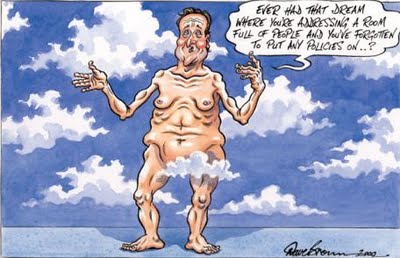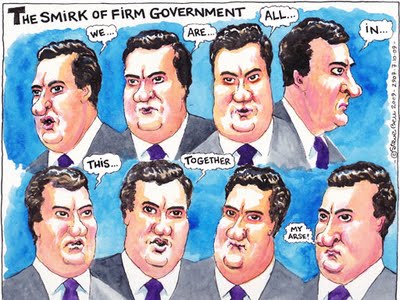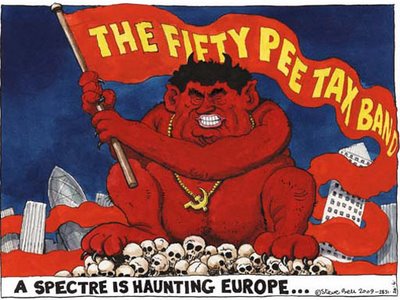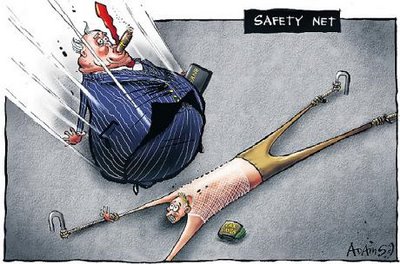 The plan for the Tory conference has been both obvious and has worked: ensure that Osborne and Cameron get all the coverage and limelight and hope that the underlings stay in the shadows, or at best don't make any horrendous gaffes. This was clearly what was in action yesterday, hoping that only the faithful or interested would notice that both Michael Gove and Chris Grayling were making speeches on their specific areas and announcing either new or somewhat new policies. As it turned out, this was further helped when Grayling himself gaffed by describing the appointment of General Dannatt as an adviser as potentially a gimmick, not realising that it was err, his side, not Labour, that had done so.
The plan for the Tory conference has been both obvious and has worked: ensure that Osborne and Cameron get all the coverage and limelight and hope that the underlings stay in the shadows, or at best don't make any horrendous gaffes. This was clearly what was in action yesterday, hoping that only the faithful or interested would notice that both Michael Gove and Chris Grayling were making speeches on their specific areas and announcing either new or somewhat new policies. As it turned out, this was further helped when Grayling himself gaffed by describing the appointment of General Dannatt as an adviser as potentially a gimmick, not realising that it was err, his side, not Labour, that had done so.
It was Gove's proposals though which were clearly the more ghastly. Alix Mortimer thinks of him as a prep school teacher circa 1965 and it's clearly a description which fits. His proposals for what should be in and out of education when the Tories come in are so overblown it reads like a an old reactionary's wish-list. What's wrong with our school system, it seems, is that the kids aren't dressed archaically enough. Just as much of the rest of society decides that suit, blazer and tie aren't perhaps the most practical or comfortable of clothes, in comes Gove, who thinks that as adults are giving up on it, children should wear it instead. His other great wheeze, setting by ability, is just as old and hoary. Listening to Gove you'd think that state schools haven't so much as tried such a thing. I hate to break it to him, but at my bog-standard, at times failing comprehensive we had setting by ability, and all it did was further entrench those in the particular sets at that level of knowledge, not stretching them or helping them, just leaving them to get on with it, failing everyone. Adding to the sense of nostalgia, rote learning was the next thing to be mentioned. He also wants "the narrative of British history" taught, without mentioning whether or not history will be made compulsory post-14, and which in any case Alix Mortimer demolishes. Just when you think it couldn't get any worse, he also wants soldiers to be brought into instil discipline, which is just the thing that we need in general in schools: ex-military personnel with a high opinion of themselves thinking that all the children of today need is regimentalism and a shared bond which develops in the line of fire.
Chris Grayling didn't have much of a chance of living up to such a litany of pure bollocks. He did though have a go, further broadening the mind-bogglingly stupid policy of taxing strong lager and cider as well as "alcopops" because of their link to anti-social behaviour. There is a case for taxing the likes of Special Brew and the ultra-strong ciders which have never seen an apple for the simple reason that the only people who drink them are alcoholics and those looking to get drunk as quickly as possible, but the downsides are obvious: when an ordinary can of Wife-Beater isn't going to cost any more, you might as well just downgrade slightly, and it's what people will do. You have to challenge the behaviour, not the drink itself. I've also lost count of the number of times I've said it here, but it needs stating yet again: those meant to be targeted by this tax do not drink alcopops. The people who do are those might get drunk, but are not those who specifically go out looking for trouble; it can be best described as a tax on those who don't like the taste of other drinks. Despite all the mocking, Grayling also still believes in the "21st century clip round the ear", now examining "grounding" as an "instant punishment". We laughed when New Labour proposed taking yobs to ATMs; now the Tories, that party of the family, wants police officers to take over parenting. Finally, once again the Tories want to ban Hizb-ut-Tahrir, a group which although reprehensible and may have incited hatred in the past, most certainly does not incite violence. If we're going to ban every group alleged to do both, why focus on HuT and not the BNP or EDL, who are the number one current threat to community cohesion? Answer came there none.
All everyone was interested in though was the main event. There is one thing to be said for Cameron's speech, and that's at least that it was a speech rather than just a series of connected thoughts, as both Brown and Clegg's attempts were. It was also a good speech in another sense: that it at least partially showed what Cameron does believe and think, and quite how wrong his interpretation is of what has gone wrong, primarily with the economy:
And here is the big argument in British politics today, put plainly and simply. Labour say that to solve the country's problems, we need more government.
Don't they see? It is more government that got us into this mess.
Why is our economy broken? Not just because Labour wrongly thought they'd abolished boom and bust. But because government got too big, spent too much and doubled the national debt.
It is indeed putting it simply, and also not accurately. Labour may have massively increased the size and scope of the state, but to break this down to saying that Labour's only solution is more government is nonsense. If it was, it wouldn't have spent the last 12 years trying to insert the private sector into every public service or continued with the horrendously wasteful private finance initiative, to give but two examples. More gob-smacking though is that Cameron seems to be suggesting that the reason our economy's broken is because of the size of government and because it spent too much: this isn't just wrong, it's politically bankrupt. The reason the economy's broken is primarily because there was too little regulation of the financial sector, not too much. Even if we had saved for that "rainy day", we'd still be in the same recession even if the deficit could be dealt with quicker, and considering that the Tories would have hardly done anything different on the economy to Labour until very recently, this is hindsight of the lowest order. He continues:
Why is our society broken? Because government got too big, did too much and undermined responsibility.
This is even more nonsense. Even if you accept that big government has and does undermine responsibility, and even if you accept that society is broken, the real thing that broke it was the undermining and even open destruction of economic communities over 20 years ago. Labour has tried and mostly failed with its initiatives, but at least it has tried. All Cameron offers, and continues to offer in this speech, is the firm smack of responsibility and the recognition of marriage in the tax system, something just bound to cure problems at a stroke and not just provide the middle classes with a helpful cut. And so it goes on:
Why are our politics broken? Because government got too big, promised too much and pretended it had all the answers.
Cameron on the other hand doesn't pretend to have answers, as he doesn't offer any specific reform of politics in this speech except for the cutting of some ministerial salaries. All the talk of a new politics has completely evaporated, and who could possibly be surprised? Cameron doesn't need to change anything to win, and so the status quo is far more attractive.
Again, like Osborne on Tuesday, Cameron also offers precisely nothing on economic recovery. It's presumably just going to happen magically, while all we need to worry about is getting the deficit down. As Chris Dillow and an increasing numbers of others are now arguing, the preoccupation with the deficit is potentially dangerous when there are other threats and decisions to be taken. The Tories have focused on the deficit because this is one of their very few selling points, yet it's also a point on which they could be attacked if Labour was reasonably sure of itself, with even the potential to turn everything back around. While trying not to be triumphalist, what is clear is that the Tories themselves are now absolutely certain of their return to power. From his mention of Afghanistan at the very beginning to the condemnation of the EU at the end, this was also a speech written to touch every hot button on which the Sun newspaper has recently focused. Nothing is being left to chance. The irony of it all is that on the one thing that the Tories are significantly at odds with Labour on, they're wrong. The sad thing is that it seems it won't make any difference.Labels: Chris Grayling, conference season, Conservative party conference, David Cameron, defence spending, economics, George Osborne, Michael Gove, policy, politics






